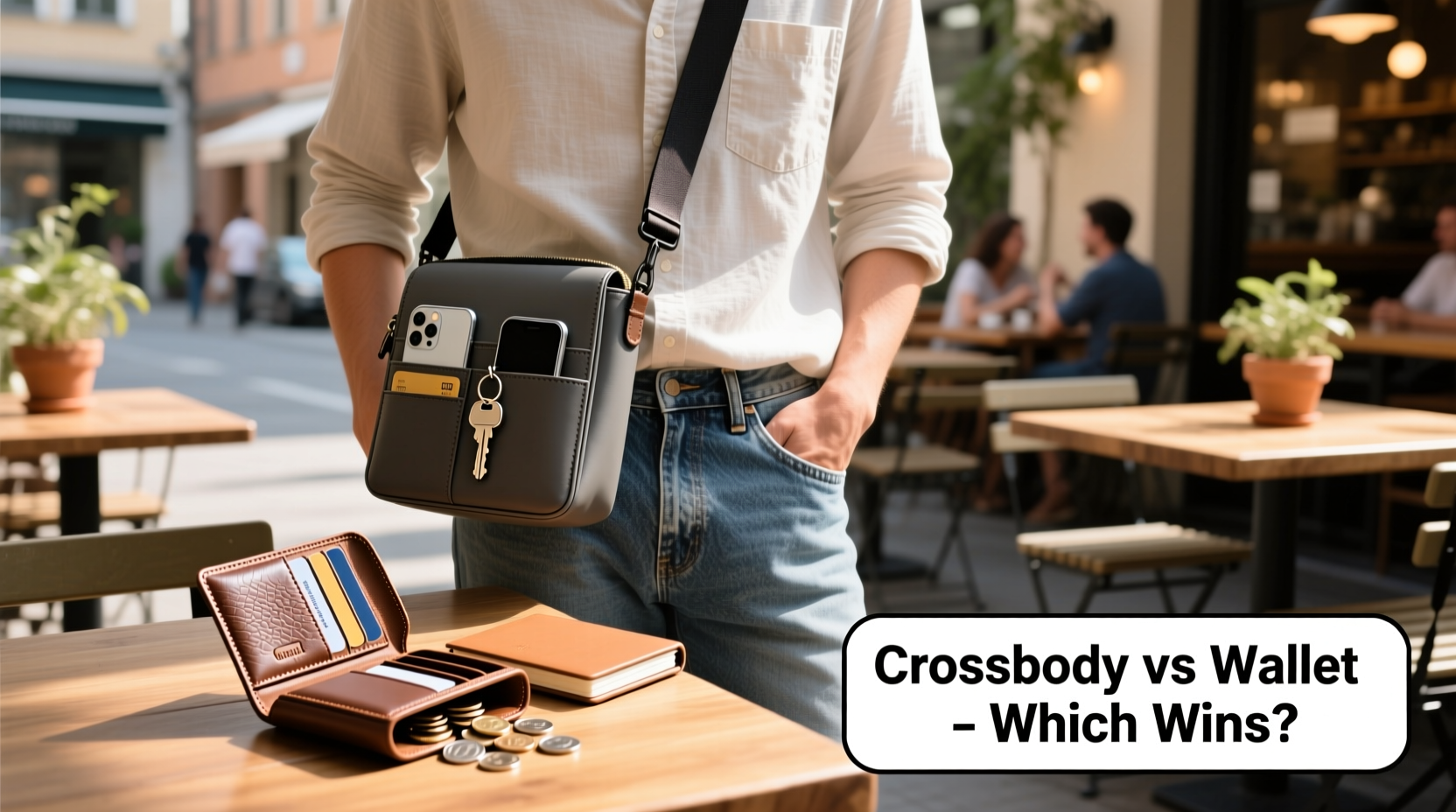Choosing between a crossbody bag and a handheld wallet isn’t just about style—it’s a decision that impacts comfort, convenience, and functionality throughout your day. Whether you're commuting, running errands, or heading out socially, the right carry option can make a noticeable difference in how efficiently you move through your routine. While both have loyal followings, their practicality depends on lifestyle, daily needs, and personal preferences. This guide breaks down the key factors to help you decide which option serves your everyday life better.
Understanding the Basics: What Each Option Offers

A **handheld wallet** is compact, minimalist, and designed to carry only essentials—typically cards, cash, and ID. It fits easily into a coat pocket or small handbag but requires constant handling if carried alone. Modern versions often include RFID protection and slim compartments for organization.
In contrast, a **crossbody bag** is a small shoulder or chest-slung bag with a long strap. It provides more storage space than a wallet, accommodating phones, keys, lip balm, sunglasses, and sometimes even a small notebook. Its hands-free design makes it ideal for active lifestyles.
The fundamental trade-off lies in capacity versus convenience. A wallet minimizes bulk but limits what you can carry. A crossbody offers freedom of movement but adds visible weight to your outfit.
Practicality Compared: Key Factors to Consider
To determine which option suits your daily life best, evaluate these core aspects:
- Hands-Free Functionality: Crossbody bags win decisively here. Once secured, they allow full use of your hands—essential for parents, cyclists, or anyone using public transit.
- Security: Crossbodies worn across the front are harder for pickpockets to access unnoticed. Wallets in back pockets or loose hands are more vulnerable.
- Capacity: Even the slimmest crossbody holds significantly more than most wallets. Need room for a phone, sanitizer, or tampons? A wallet won’t cut it.
- Comfort Over Time: Lightweight wallets cause no strain. However, poorly padded crossbody straps can dig into shoulders after hours of wear.
- Style Flexibility: Handheld wallets offer sleek elegance under a blazer or evening dress. Crossbodies lean casual, though structured designs now bridge formal gaps.
When Minimalism Wins: The Case for the Handheld Wallet
For those who embrace minimalism, the handheld wallet excels. Urban professionals walking short distances, individuals attending dinner events, or people who rely on smartphones for payments often find that a slim wallet eliminates unnecessary clutter.
Consider Sarah, a graphic designer based in downtown Seattle. She walks 15 minutes to work, carries her laptop in a backpack, and uses Apple Pay exclusively. Her only physical items are her driver’s license and one emergency credit card. A leather bifold wallet fits perfectly in her jacket pocket—no need for extra baggage. In her case, adding a crossbody would be redundant and visually disruptive to her clean aesthetic.
“Minimal carry isn’t about having less—it’s about removing friction from your daily flow.” — James Reed, Urban Lifestyle Consultant
When Functionality Matters Most: Why Crossbody Bags Shine
On the other end of the spectrum are users whose days involve movement, multitasking, and variable environments. Parents, travelers, students, and service workers benefit greatly from the hands-free advantage and added storage of a crossbody bag.
Take Marcus, a middle school teacher in Chicago. His day starts with coffee pickup, includes classroom transitions, lunchroom duty, and ends with grocery shopping. He carries his phone, keys, a small notebook, hand sanitizer, and occasionally a granola bar. A handheld wallet wouldn’t accommodate this load. Instead, he uses a compact nylon crossbody with multiple zippered compartments. It stays secure while he gestures during lessons and frees his hands when opening doors or helping students.
Moreover, crossbody bags provide peace of mind in crowded areas. Worn diagonally across the chest, they’re harder to snatch and easier to monitor visually.
Side-by-Side Comparison: Crossbody vs. Handheld Wallet
| Feature | Crossbody Bag | Handheld Wallet |
|---|---|---|
| Hands-Free Use | Yes | No (unless in pocket) |
| Storage Capacity | High (phone, keys, small items) | Low (cards, cash, ID) |
| Theft Resistance | Moderate to High (when worn correctly) | Low (if held loosely) |
| Comfort (Extended Wear) | Varies by strap design | Excellent (minimalist) |
| Fashion Versatility | Casual to Smart-Casual | All occasions (especially formal) |
| Daily Practicality (Active Lifestyles) | High | Low |
How to Choose Based on Your Lifestyle
Your ideal choice hinges on how you spend your typical day. Follow this step-by-step evaluation to make an informed decision:
- Inventory Your Daily Carry: List every item you regularly bring outside the house. If it exceeds two cards, cash, and a phone, lean toward a crossbody.
- Assess Your Movement Level: Do you walk long distances, bike, drive, or stand for extended periods? High mobility favors crossbody use.
- Evaluate Security Needs: Frequent travel or time in crowded cities increases theft risk—opt for a crossbody worn in front.
- Match to Your Wardrobe: Formal attire may call for a sleek wallet tucked into a coat. Casual or layered outfits pair well with crossbodies.
- Test for Comfort: Try wearing each option for a full day. Note any shoulder strain, inconvenience, or forgotten essentials.
Frequently Asked Questions
Can I use both a crossbody and a wallet together?
Absolutely. Many people carry a small crossbody and place a minimalist wallet inside it. This setup combines security, capacity, and organization. Some crossbodies even feature built-in RFID-blocking wallet compartments.
Are crossbody bags safe from pickpockets?
They are safer than traditional handbags or back-pocket wallets, especially when worn across the front. Opt for models with slash-resistant straps and lockable zippers for maximum protection in high-risk areas.
Is a handheld wallet enough for city living?
It depends on your habits. If you rely on digital payments, live near amenities, and avoid bulky items, yes. But if you frequently need transit passes, medications, or personal care items, a wallet alone will fall short.
Action Checklist: Choosing Your Ideal Everyday Carry
- ✅ Audit your daily essentials list
- ✅ Identify your primary activities (commuting, parenting, working, etc.)
- ✅ Determine your top priority: minimalism, security, comfort, or capacity
- ✅ Try a crossbody for three consecutive days
- ✅ Test a handheld wallet-only approach for comparison
- ✅ Choose based on real-world performance, not aesthetics alone
Final Thoughts: Practicality Is Personal
There’s no universal answer to whether a crossbody bag or handheld wallet is more practical. The truth is, the best choice aligns with your specific rhythm of life. For those prioritizing efficiency, safety, and versatility, the crossbody bag often proves superior. But for lovers of simplicity, elegance, and lightness, the handheld wallet remains unmatched.
Rather than chasing trends, focus on intentionality. Ask yourself: does this accessory serve me, or do I serve it? Whether you go minimalist or opt for functional carry, the goal is seamless integration into your daily experience.









 浙公网安备
33010002000092号
浙公网安备
33010002000092号 浙B2-20120091-4
浙B2-20120091-4
Comments
No comments yet. Why don't you start the discussion?